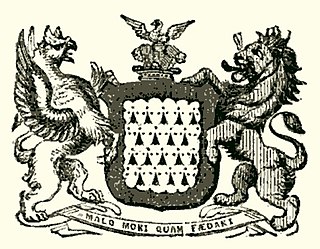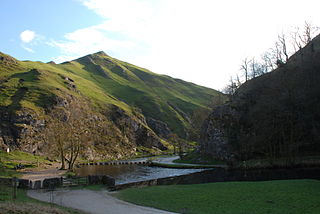
John Barnewall, 3rd Baron Trimleston, was an Irish nobleman, judge and politician. He was the eldest son of Christopher Barnewall, 2nd Baron Trimlestown and his wife Elizabeth Plunket, daughter of Sir Thomas Fitz-Christopher Plunket of Rathmore, Lord Chief Justice of the King's Bench in Ireland and his second wife Marian Cruise. He succeeded his father as 3rd Baron about 1513. His father, like most of the Anglo-Irish aristocracy, had supported the claim of the pretender Lambert Simnel to the English throne in 1487. After the failure of Simnel's rebellion, he received a royal pardon.

The chief justice of the Common Pleas for Ireland was the presiding judge of the Court of Common Pleas in Ireland, which was known in its early years as the Court of Common Bench, or simply as "the Bench", or "the Dublin bench". It was one of the senior courts of common law in Ireland, and was a mirror of the Court of Common Pleas in England. The Court of Common Pleas was one of the "four courts" which sat in the building in Dublin which is still known as the Four Courts, apart from a period in the fourteenth century when it relocated to Carlow, which was thought, wrongly as it turned out, to be both more central and more secure for the rulers of Norman Ireland.
Sir Robert Dillon of Riverston was an Irish lawyer, judge, and politician. He came from a family with a distinguished record of judicial service. He pursued a successful career as a judge, which was, however, dogged by accusations of corruption and other serious wrongdoing, of which the worst was that he had falsely condemned Nicholas Nugent, another judge and rival, to death. Sir Robert Dillon, the subject of this article, must not be confused with an earlier Sir Robert Dillon of Newtown, his grand-uncle, who was also Chief Justice of the Irish Common Pleas.
Richard Plunkett (c.1340-1393) was an eminent Irish judge and statesman of the fourteenth century, who held the offices of Lord Chief Justice of Ireland and Lord Chancellor of Ireland. His descendants held the titles Baron Dunsany, Baron Killeen and Earl of Fingall.
Sir Thomas Luttrell was a wealthy Anglo-Irish landowner of the sixteenth-century Irish Pale. He was also a distinguished lawyer and judge who held the offices of King's Serjeant, Solicitor General for Ireland and Chief Justice of the Irish Common Pleas.
Sir James Dowdall was an Irish judge of the Elizabethan era who briefly held office as Lord Chief Justice of Ireland. He should not be confused with James Dowdall, the Catholic martyr, who was his cousin.
Sir Robert Dowdall was an Irish judge who held the office of Chief Justice of the Irish Common Pleas for more than forty years. He is mainly remembered today for the murderous assault on him by Sir James Keating, the Prior of Kilmainham, in 1462.
Patrick Bermingham (c.1460–1532) was an Irish judge and statesman of the Tudor period who held the offices of Lord Chief Justice of Ireland and Chancellor of the Exchequer of Ireland. He was a firm supporter of English rule in Ireland and enjoyed the confidence of Henry VIII, who regarded him as a mainstay of the Irish administration.
Philip Bermingham (c.1420–1490) was an Irish judge who held the office of Lord Chief Justice of Ireland. He was regarded as "the most learned Irish lawyer of his time", but he had a somewhat turbulent political career and was twice accused of treason.
Sir Simon Fitz-Richard was an Irish landowner, barrister and judge. He became Chief Justice of the Irish Common Pleas, and fought a long and successful campaign against the efforts of his enemies to remove him from office, despite the numerous accusations of corruption which were made against him.
Robert de Scardeburgh, or de Scardeburg was an English judge who also held high judicial office in Ireland.
Sir Elias de Asshebournham, or Ellis de Ashbourne (c.1290-1357/8) was an Irish judge who held the office of Lord Chief Justice of Ireland, and fought a long battle with a rival candidate, Thomas Louth, to retain it. Despite frequent allegations of corruption, and a reputation for violence, for many years he retained the confidence of the English Crown, although he also suffered periods of imprisonment.
John Keppock was an Irish judge of the late fourteenth century, who held the offices of Lord Chief Justice of Ireland, Chief Baron of the Irish Exchequer and Deputy Lord Chancellor of Ireland. He became a politician of some importance.
Robert de Holywood was an Irish judge and landowner who held the office of Chief Baron of the Irish Exchequer. He was the ancestor of the Holywood family of Artane Castle, and of the St. Lawrence family, Earls of Howth. He was a substantial landowner with property in Dublin, Meath and Louth. He became extremely unpopular, and was removed from office after numerous complaints of "oppression and extortion" were made against him. These were apparently inspired by his close association in the mid-1370s with Sir William de Windsor, the embattled Lord Lieutenant of Ireland.

Sir Peter Tilliol, also called Peter de Tilliol (1299-1348) was a Cumberland landowner, politician and judge; he was High Sheriff of Cumberland, and served briefly as Lord Chief Justice of Ireland.
John Bermyngham or Bermingham was an Irish barrister and judge. He was one of the first Crown Law officers to be referred to as the King's Serjeant. He was later appointed Lord Chief Justice of Ireland, but did not take up the office.
John Gernoun, or Gernon was an Irish landowner, soldier and judge who held office as Serjeant-at-law (Ireland) and Chief Justice of the Irish Common Pleas. He gave good service to the Crown during the Scottish Invasion of 1315-18, but as a judge, he was accused of injustice.

Thomas Dowdall, also spelt Dowdale, Douedall, or Dowedall, was an Irish barrister and judge who held the office of Master of the Rolls in Ireland.

Thomas de Dent, Thomas Dyvelyn, Thomas Denton, or Thomas of Dublin was an English-born cleric and judge who held high office in Ireland during the reign of King Edward III, and was praised as a diligent and hard-working Crown official, who damaged his health through overwork.
John Fitzadam was an Irish judge of the late fourteenth and early fifteenth century. He is notable for his very long tenure as Chief Justice of the Irish Common Pleas; he held the office for twenty-three years, in the reigns of three English Kings. Some years after his death, he was accused of judicial misconduct, in that he had unduly favoured one party in a lawsuit, but it is impossible now to determine the truth of the matter.





